HIT CHANNEL EXCLUSIVE INTERVIEW: November 2020. We had the honour to talk with a legendary musician: John Lodge. He is best known as bass player, singer and songwriter of the Moody Blues, one of the greatest bands of all time. He joined the band in 1966 and he has recorded with them monumental albums such as “Days of Future Passed”, “In Search of the Lost Chord” and “To Our Children’s Children’s Children”. Also, he has a successful solo career. In 2019, he released a solo compilation album called “B Yond – The Very Best of”. His latest solo effort is the single “In These Crazy Times”. Read the very interesting things he told us:
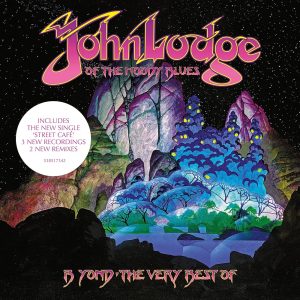 Are you satisfied with the response you got so far for your new single “In These Crazy Times”?
Are you satisfied with the response you got so far for your new single “In These Crazy Times”?
I’m very-very pleased with the response. I hope everyone in the world can listen to it and I hope they can listen to it in Greece. I’m very pleased. I wrote the song, you may know, while I was in isolation. I recorded everything myself on GarageBand, I had to learn GarageBand and I had my son to play lead guitar in isolation from his house. Then, Jon Davison from Yes from his home sang the backing vocals and my wife sang the backing vocals right from my home.
“In These Crazy Times” is a very relevant song. What’s the story behind this song?
I was in Naples, in Florida. My son lives there and I just finished a US tour and I flew to Naples to be with my son, my grandson and my wife. We arrived on March 10th and on March 13th we were locked down and I was stuck in Naples, in Florida for four months. While I was there I bought a computer and two speakers and learned GarageBand and I thought just to make some demonstration song, but when I was recording I realised that “In These Crazy Times” sounded like a real record. I played it to my daughter, Emily, who manages me and said: “Daddy, you’ve got to release that as a single”. I didn’t know how to do it but she did it. It was released as a single and it charted on The Heritage Chart on a radio station called United DJs and it reached #3. It’s been on the chart for 15 weeks.
How did you come up with the idea to release a solo compilation album, “B Yond – The Very Best of”?
I was talking with BMG Records and they wanted me to do something with them. I didn’t know what to do, but there was a movie released in 2018 called “Private Life” and one of the songs in that movie was “Say You Love Me” from my album “Natural Avenue” (1977). When I listened to it, I thought with technology today it would be great to go back in some studio and remix that record. While I was thinking about that, BMG asked me to make a record and I thought that the best thing to do is to try and bring everyone in the world, if possible, up to date to who John Lodge is. Because being a Moody Blue all my life, I thought it would be nice for people to know that I’ve written other songs, as well. So, I went in the studio with my original bass guitar, re-recorded some songs and then I released the album “B Yond”.
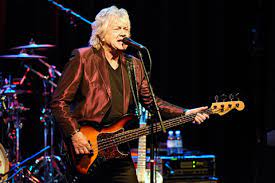 Why did you decide to recreate three songs (“Street Café”, “(Evening) Time to Get Away” and “Legend of a Mind”) on “B Yond – The Very Best of”?
Why did you decide to recreate three songs (“Street Café”, “(Evening) Time to Get Away” and “Legend of a Mind”) on “B Yond – The Very Best of”?
Well, “Street Café” has always been a favourite song of mine and the record company really liked that song and they said: “Is it possible to re-make the song for 2020?” That I did. I went into the studio and we recorded the song completely and I changed some of the lyrics that I thought they weren’t reflective of 2020, so that changed. I was pleased with that. Then, “Legend of a Mind”, I recorded that because Ray Thomas, the flute player in The Moody Blues and I, had been working together since of I was 15 years of age. Ray unfortunately died and I wanted to keep Ray’s music alive. When we were living together in London, in a little flat, in Barnes, Ray sang me the song one day. He said: “I ‘ve written this song called ‘Legend of a Mind’ about Timothy Leary”. So, I worked on the bass parts for the song and it has been an integral part of my life ever since. I wanted to record that song and I actually performed it live on stage, as well and the reaction is superb.
On “B Yond – The Very Best of” you collaborated again with Roger Dean. What does his artwork add to your music?
I love Roger Dean. My first album was called “Natural Avenue” (1977) and before that, I’ve always loved Roger Dean’s work. I really wanted Roger Dean to do a Moody Blues album, because I think The Moody Blues albums in the ‘80s and ‘90s needed stronger album sleeves and I wanted Roger Dean to do the artwork. When I made my solo album, “Natural Avenue”, I just asked Roger Dean to do the artwork for me. It seems to conjure up what for me not is not mystical, but space and infinity and that’s how I want my music to sound. I wanted to be able the people’s mind to explore the music and explore the songs.
“Lose Your Love” from your “10,000 Light Years Ago” (2015) solo album is one of the best ballads of the 21st century. Would you like to tell us a few words about this song?
Yes, I like this song. We went to the studio and it was one take. The vocals, the guitar, everything was one take. It’s the most special song for me, “Lose Your Love”, because… that song it’s like a naked song. When I was writing that song and singing it was like I was standing naked. So, everyone could see through me, if that makes sense.
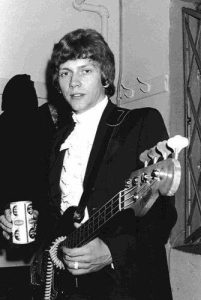 How emotional was it for you to record “Simply Magic” on “10,000 Light Years Ago” with your former bandmates Ray Thomas (flute) and Mike Pinder (mellotron)?
How emotional was it for you to record “Simply Magic” on “10,000 Light Years Ago” with your former bandmates Ray Thomas (flute) and Mike Pinder (mellotron)?
It was fantastic! Fantastic! I wrote this song for my grandson and I was playing it one day to myself thinking about how to record it and then I starkly thought: “It’s obvious! It sounds like a Moody Blues song and I am gonna ask Ray Thomas to play flute”. So, Ray Thomas lived with his wife one mile from here I live. We lived very close together. I went to his house and I played him the song and said: “You have to play flute”. We went into the studio and we recorded Ray playing the flute and while we were in the studio Ray said to me: “You should ask Mike to play mellotron”. I rang Mike Pinder up in America, for he lives in California and I said: “Mike, I am gonna send you the files for this song of mine, please play mellotron” and I sent him the song and he played mellotron. It was wonderful for me because to be back in the studio really recording with my friends Ray Thomas and Mike Pinder was fantastic.
Did you enjoy performing “Imagine” (John Lennon) with Yes during The Royal Affair Tour last year?
I really enjoyed it. The Royal Affair Tour was a fantastic tour last year and we are hoping to be able to take it around the world. I have never performed in Greece, we would love to come to Greece, but because of the coronavirus everything has gone wrong, you know. Jon Davison, the singer from Yes, joined me every night when I did my encore of “Ride My See-Saw” and then Yes, Steve Howe (guitar), Geoff Downes (keyboards) and the rest of the guys in Yes and Jon, said: “Would you come and join us on stage and sing ‘Imagine’?” I met John Lennon in 1963, a long time ago and “Imagine” is one of my all-time favourite songs by anybody. I said: “I would love to sing it”. So, we sang it every night on stage as the encore and then they released the album of that, “The Royal Affair Tour: Live from Las Vegas” and “Imagine” I think it’s the first single that they released from that album.
What are your solo plans for the near future?
I am now recording another new song which I am just mastering it right now. So, that’s gonna be the new single. I hope to release that before Christmas, so I’m really excited about that. Also, at the moment, I am mixing my Royal Affair Tour as well from last year, and I will release that in the new year, in March. So, I ‘m excited about that. At the moment, with a bit of luck, I’m doing the Isle of Wight in England in September 5th I think, the 50th anniversary of The Isle of Wight Festival and then hopefully I am doing the tour of Great Britain in September and October. But if I have to come to Greece, I ‘d love to come to Greece. I was in Mykonos, last year on holiday and I love Greece. Greece is a great place, you know. Very beautiful.
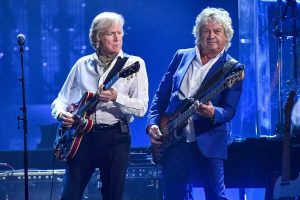 “Days of Future Passed” (1967) is probably the first ever progressive rock album. Did you realise when you recorded it that you created a revolutionary album?
“Days of Future Passed” (1967) is probably the first ever progressive rock album. Did you realise when you recorded it that you created a revolutionary album?
No, we didn’t. No, we didn’t. It was something we wanted to do. When we recorded the album and we finished the album, the record company didn’t want to release it. They didn’t understand the record at all. But, fortunately, we had the president of the record company in New York; he understood it. Also, the classical music director of the record company in England, he understood it as well. We were very fortune, we had two people who understood our music. We knew it was different because we played the songs live on stage and the audience respected the songs differently to all the other songs that they were like pop songs. They would sit down and listen to the band’s music, which was fantastic.
What influenced you to write “Eyes of a Child” (from “To Our Children’s Children’s Children” -1969)? It’s my favourite Moody Blues song.
Thank you. We were trying to think what it would be like to be an astronaut, to fly to the moon. Really, it was that. When you look at life through the eyes of a child there is a wonderment, isn’t it? Children see the world differently. There are wonders every day: When you see a butterfly flying or when you see a bird flying or when you see anything, it’s just a wonderful world for children to see. I thought, as we become older, we become prejudiced and if you can rid of whatever your prejudice is, you just see the world in naivety, without any restriction. It’s wonderful for everyone to be able to see everything in life without any prejudice.
How important was the role of the producer Tony Clarke in The Moody Blues recordings?
It was very important. For me, what was really important was that he became a friend of mine. For me, when you got people who you could relate to musically and also you are able to talk to as a friend, it makes all the difference in the world. So, when I was be talking about a song to him, I knew he was trying to get exactly the right thing that I wanted for the song. But if it wasn’t (ed: right), then he would change everything like producers do today. A lot of producers want just to produce their own songs, they are not interested very much in what the writer wants to do. But Tony was fabulous in helping me and the rest of the band to create the songs we wanted to create. It was very important to have someone in the studio, in the control room who could actually steer the spaceship, I might say, steer us with the right direction all along.
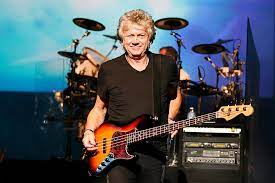 Do you have any memories of your performance at The Isle of Wight Festival in 1970?
Do you have any memories of your performance at The Isle of Wight Festival in 1970?
It was just an amazing experience. That period of time was just amazing experience, because it was the first time for young people from all over the world getting together for one thing only and that was the Western music. You have to remember in 1970, there was the Cold War, the Iron Curtain. People from Eastern Europe were devoid of listening to Western music, but the Isle of Wight changed all that. We had so many people going to the Isle of Wight to listen to music. It was like the first gathering of young people around the world, all united for one thing: Music.
In the ‘80s, Tony Visconti (David Bowie, Thin Lizzy) produced two albums (1986’s “The Other Side Of Life” and 1988’s “Sur la Mer”) for The Moody Blues. What do you think about these albums nowadays?
They are interesting albums for me because Tony Visconti, he was a producer, as against Tony Clarke who was a friend and a producer. I became a very good friend of Tony Visconti’s, anyway. But it was a time of computers and certainly I think the control of songs went into the control room, instead of being controlled by the artists in the studio. That was a different period of time but he made great records for us. He showed me a lot of things about how to work computers and that stayed with me. I did “In These Crazy Times” because Tony really taught me about computers. It transpired to be part of my life.
Was it an interesting experience to back Tom Jones in the song “It’s a Hang Up Baby” on his TV show in 1969?
(Laughs) You did good research! Tom Jones was signed to an agent. He was the first agent then. Tom Jones was doing a live concert in Paris, at The Olympia Theatre in Paris, and this was in 1967, I think. He had a song called “It’s Not Unusual” and he was doing the concert and it was called The Tom Jones Show, but Tom Jones didn’t have a whole concert, so we were in Belgium rehearsing and they asked us to be on the concert with Tom Jones and then it became a friendship. After that, we signed with the same agent and when the Tom Jones television show was on, they asked us to join Tom Jones.
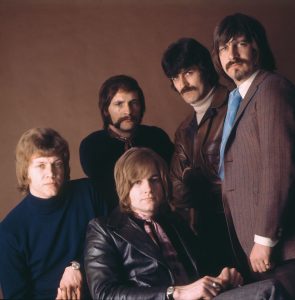 What does the 2018 Rock and Roll Hall of Fame induction mean to you?
What does the 2018 Rock and Roll Hall of Fame induction mean to you?
You know, I got into the business, not for fame, fortune or anything. I just loved rock ‘n’ roll music, I just loved it. When we were going into the Rock and Roll Hall of Fame it didn’t at first mean an incredible amount to me, but when we were actually inducted, it changed my life and how I thought. Because my hero was Buddy Holly. My absolute hero is Buddy Holly and suddenly I’m in the Rock and Roll Hall of Fame standing shoulder to shoulder with Buddy Holly. To me, that was like: “Ah, apparently I couldn’t get any better than that”. Then, on a personal level, I went forward many years and thought about my grandson taking his children to the Rock and Roll Hall of Fame and saying to his children: “Hey, that’s my granddad there”. I thought that would be great for him.
Do you consider yourself a bass player or a songwriter?
Bass player. I just absolutely love bass playing, but I suddenly realised that the great thing to do is to be a songwriter as well and then I can incorporate both of them. I do enjoy some writing, but I love bass playing. So, what can I say?
Could you describe to us your love for your historic Fender Precision bass?
That is the most amazing thing in the world. I am recording with it right now. I have a studio at home and I am recording right now with that bass. It has flatwound strings as against roundwound strings, but it just sounds tremendous. It was built in 1959 and I bought it either in 1959 or 1960 and it has performed every Moody Blues song that I have recorded and I think that I have recorded every John Lodge song with that bass, as well. It’s something very special. As soon as I play the bass, it seems to know what to do. It’s just amazing. It just feels right. The balance is perfect. The balance of the bass is absolutely perfect. There was not bass guitar in England when I was growing up. No bass whatsoever. Then, I saw a movie with a band called The Premiers and there was a guy that I was thinking he was playing a Stratocaster guitar and then I saw that the guitar had four strings and I realised that it was the electric bass, not an electric guitar and that was what I really wanted. Then, one day I was in Birmingham at a shop that sold all the musical instruments and while I was in the window it said: “Direct from the USA. Fender Precision Sunburst Bass” and that was it. My love affair began.
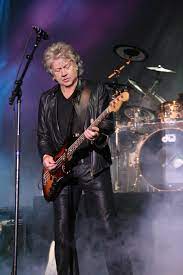 You produced the first two Trapeze albums. Are you proud that “Medusa” (1970) is considered a cult album?
You produced the first two Trapeze albums. Are you proud that “Medusa” (1970) is considered a cult album?
I really liked Trapeze. I liked the 5-member band on the first album (ed: “Trapeze” -1970) and I loved the 3-member band on the second album, “Medusa”. To me, it was a very special album. I really-really watched the careers of everybody in that band going forward: From Whitesnake (ed: Mel Galley -guitar, vocals) to Deep Purple. Glenn Hughes (ed: Deep Purple, Gary Moore) is just a great singer, a great songwriter and a beautiful bass player. I am really proud of that album and that’s funny because it has just been re-released (laughs)! I am really proud of that album.
I know you are a big Buddy Holly fan. What is so special about him?
He was the first rock ‘n’ roll person who was not an icon. What I mean is: When you think of Elvis Presley, Jerry Lee Lewis, Little Richard, Gene Vincent, they were all iconic people. I don’t think English people could do that. It’s impossible. Buddy Holly came and he was a songwriter as well as a singer and a guitarist and I just realised that’s what I could do. There was this guy wearing glasses and a dinner suit with a black tie. He didn’t apply to an iconic rock ‘n’ roll singer. But he was. He was an amazing singer, songwriter and guitarist and I realised -for me- that was how I could do it: Write songs and be true on things that I am playing on guitar, but of course for me is a bass guitar.
How did you get to record “Doctor In Distress” song in 1985?
We were all “Doctor Who” fans and they were taking it off the television. They said it was old-fashioned and didn’t want to air it anymore. So, we said: “Come on, that’s not right”. People were in love with “Doctor Who” and this new generation wants to see “Doctor Who”. We proved right because it still is one of the biggest television shows ever. So, we went into the studio and we recorded “Doctor In Distress”.
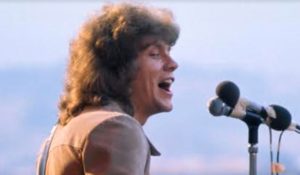 Do you feel lucky that you got to know The Beatles?
Do you feel lucky that you got to know The Beatles?
Yes, I did. You were talking about Buddy Holly; Paul McCartney bought Buddy Holly’s catalogue and I had a lunch with Paul McCartney and we talked about Buddy and the other Crickets, so that was fabulous. I actually saw Buddy Holly live in Birmingham when I was 13 and I still got the programme. So, I went to lunch and took the programme with me. The lunch was fantastic! I played in America’s Independence concert with Ringo Starr many years ago and also we played the Heart Beat which was a charity concert and we had George Harrison perform there, as well. We were really all part of British music and all that. I think they call it “the British Invasion of the world with music”.
You have also your own wine label, Krisemma Wine. How did you become interested in winemaking?
I always enjoyed wine. I went to Burgundy in France a few times and I became a Chevalier (ed: du Tastevin). I love what the picker does. I love Wine Country (ed: in California) where they make wine; it’s such a beautiful place. In America is Sonoma and Napa Valley; they are just beautiful places. I got interested and then one day I was in Napa Valley and I met a winemaker and we were talking and I said: “Oh, I ‘d love to make wine”. We made our first wine out of Napa Valley and then we made another wine out of Bordeaux. In 2014, I met a winemaker in South Africa and we made a Chardonnay Wine, which, I am pleased to say, was the best international wine out of Africa in 2016. So, it was very-very successful.
Did you have fun playing at the Heart Beat 86 benefit concert with ELO, Robert Plant and George Harrison? You all did “Johnny B. Goode” as finale.
Yes, of course. To go back to Birmingham with Robert Plant and Bev Bevan (ELO, The Move, Black Sabbath -drums), it was just brilliant. Yes, we played “Johnny B. Goode” with George Harrison on guitar as well, Jeff Lynne, everyone. It was just a fluke. Brilliant players. Brilliant times.
In 1983, Stevie Ray Vaughan opened 17 shows for The Moody Blues in North America. Did you have a good time touring with him?
We had a great time. We always tried to find new artists to open doors, so that we can give them a good platform. Over the years, we had John Denver opened for us. We had lots of different people, but Stevie Ray Vaughan & Double Trouble were just brilliant. A few years ago, we met his manager and he thanked us for giving Stevie Ray Vaughan the opportunity to perform in front of big crowd.
Do you believe that popular music which was written in the ‘60s and ‘70s is much better that today’s music?
Yeah. We have a great station now. It’s all over the world, I think. It is called United DJs (https://www.uniteddj.com) and I recommend everyone to listen to it because they play such a fantastic music all day long, 24 hours a day. It has DJs from all over the world, America, from everywhere. Those times were very special for me, not just because we were part of it, but there was something very special about the music that was written by the artists in the ‘60s and ‘70s.
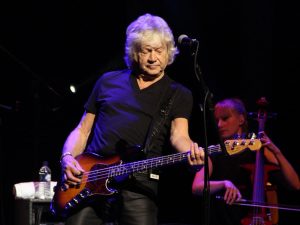 Did you like other bass players from your era, such as Jack Bruce (Cream) and John Entwistle (The Who)?
Did you like other bass players from your era, such as Jack Bruce (Cream) and John Entwistle (The Who)?
Yeah, I knew John. I did some concerts with Jack Bruce. We actually did the very first concert that Cream did in Paris and we did their very last concert in Baltimore in America. Jack Bruce had a 6-sting bass and I got a 6-string bass, as well. He was a brilliant bass player. John Entwistle was always very special and you could feel it. I loved a lot of John’s bass playing in The Who. It’s just brilliant. Also, Paul McCartney, listen to his playing. All bass players. We were all experimenting. Carol Kaye (ed: Frank Zappa, Frank Sinatra, The Beach Boys) in America, someone who was just brilliant and of course, James Jamerson from Motown. He was remarkable for me because he showed me how bass riffs could actually become the song. I am always proud of that. It is in a lot of my bass playing lines: “I’m Just a Singer (In a Rock and Roll Band)”, the bass part is about the song.
It’s lead bass.
It is a lead bass and it’s very important for me. I am in a band, in The Moody Blues and there is just one guitar and one bass. So, it’s very important for my bass playing to be a lead bass playing. With my live band on The Royal Affair tour we recorded another version of “Nights In White Satin”, with Jon Davison singing, from Yes and I played lead bass guitar on the chorus. And of course, “Legend of a Mind” has a lead bass playing part. Another song which we didn’t record -but we did record with the Moodies- was “Questions” which has another lead bass part. For me, lead bass is very important and James Jamerson really showed me the way.
A huge “THANK YOU” to Mr. John Lodge for his time. I should also that Emily Lodge for her valuable help.
Official John Lodge website: https://www.johnlodge.com/
Official John Lodge Facebook page: https://www.facebook.com/johnlodgemusic/
Krisemma Wine by John Lodge website: https://www.krisemmawine.com/

